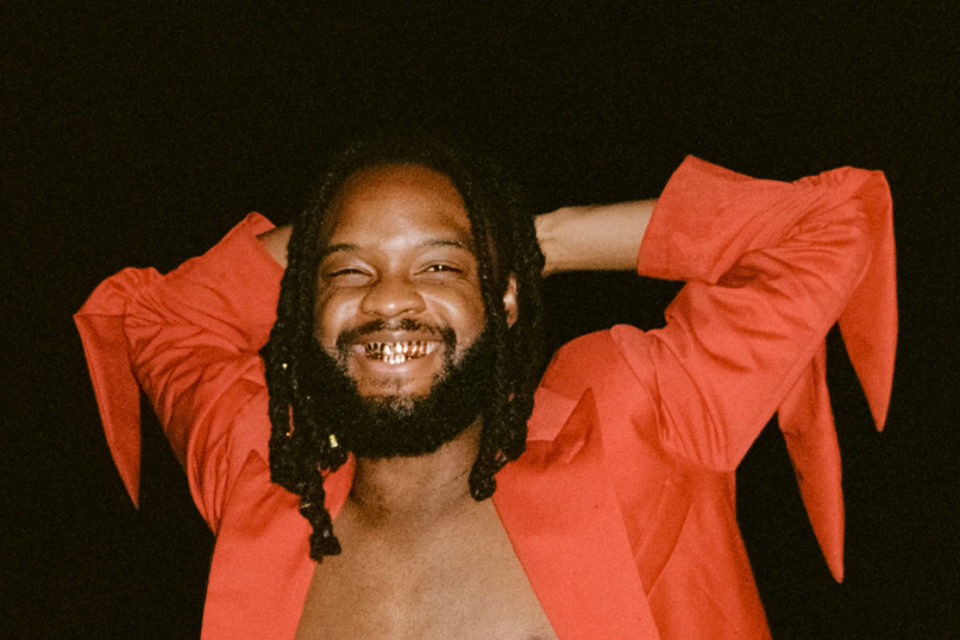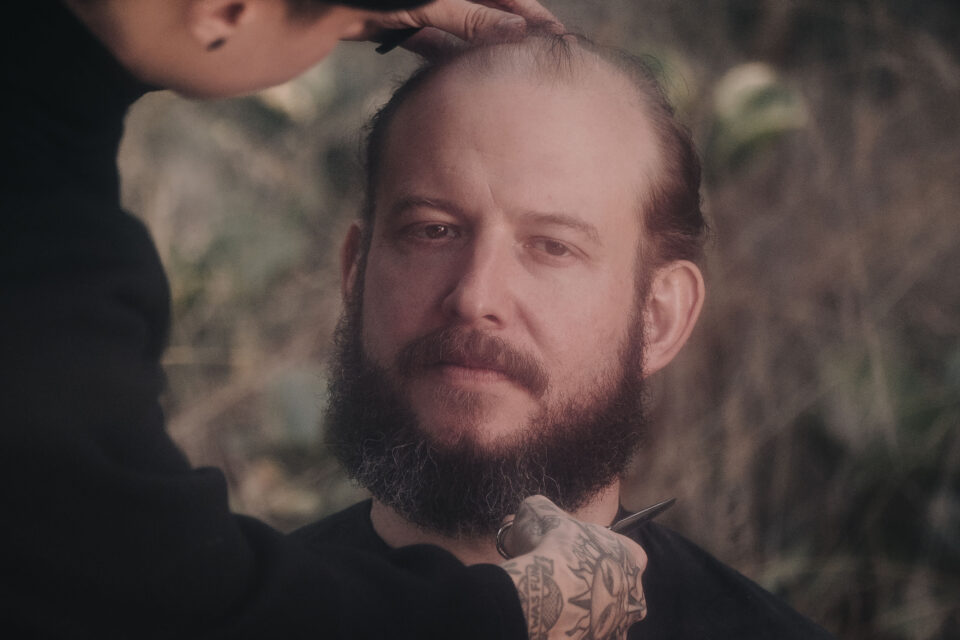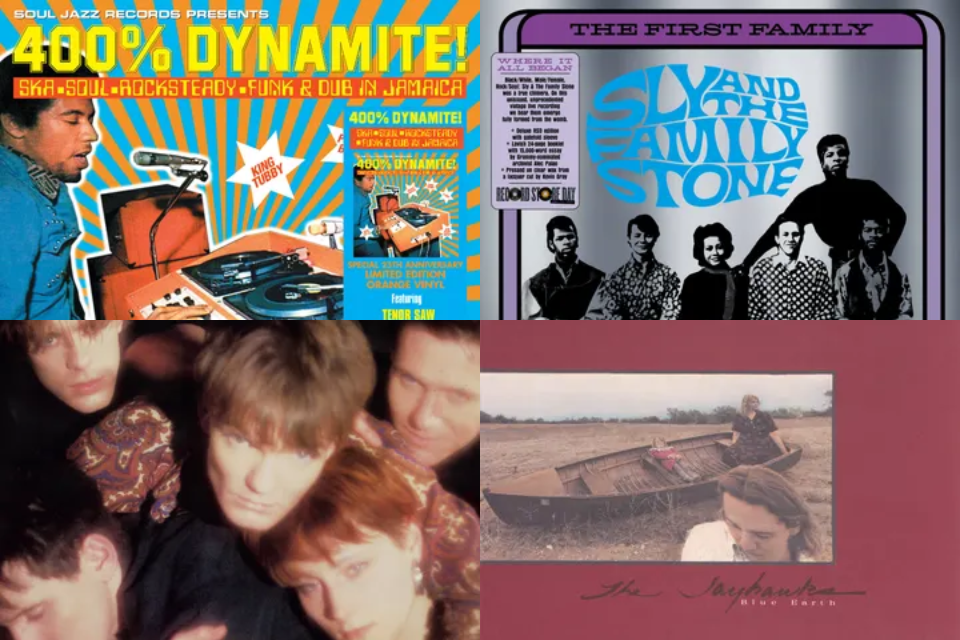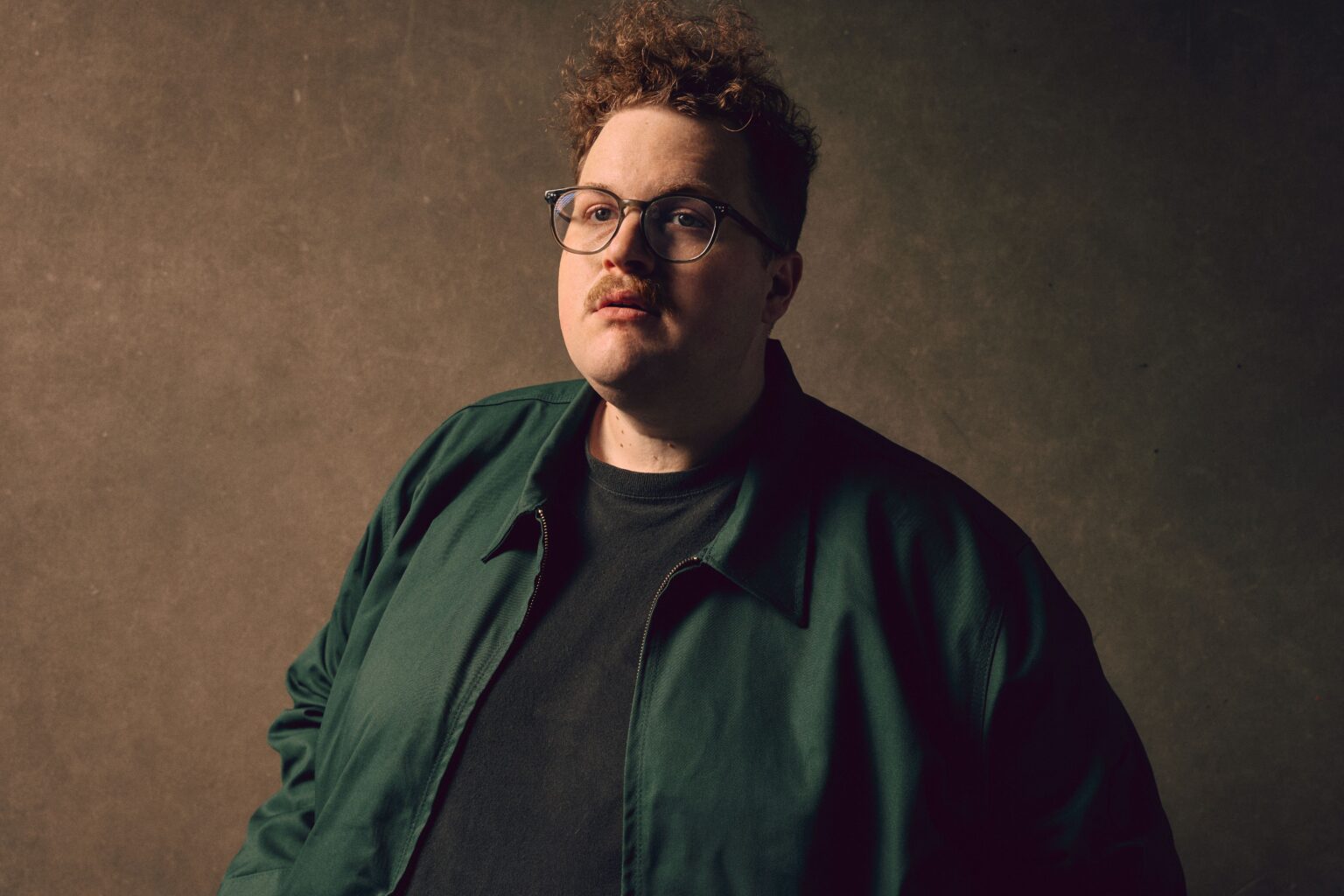About The Record
Ghanaian-born, Australian-based singer and rapper Genesis Owusu makes the kind of music that catches you off guard.
The first time I heard his 2020 single “Don’t Need You,” I wanted to know more. It sounded like a biting goodbye to someone he wanted out of his life, but it was also fun, funky and full of personality. Neither that track nor anything else on his debut album, Smiling With No Teeth, is easy to pin down, because he experiments with different genres, from raw, modern rap to post-punk, funk and even folk-pop influences and the deeper you dig into his lyrics, the more you find.
Owusu says that the experience of growing up as a young, Black kid in Australia, feeling like an outcast and taking that role as a badge of honor helped him develop a sound that would become unique and unorthodox. Gathering musicians with backgrounds in different genres to record the album, the now-22-year-old Owusu embraced hours-long jam sessions to capture many styles.
The sounds are funky, melodic and upbeat, but in the lyrics, he addresses his own personal struggles with mental health and encounters with racism. During “No Looking Back,” he sings, “I had the shackles tightly. My soul was wily, and I always wondered if sun would find me. I would stumble blindly through all these tears, oh, ’til I recognized I’m stronger than my fears.” All those elements add up to music that he calls “beautiful, youthful, ugly, timeless and strange.”
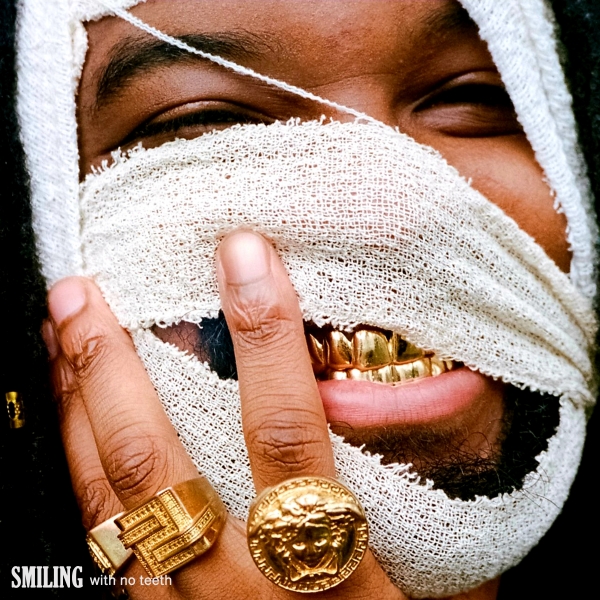
Artist: Genesis Owusu
Project: Smiling With No Teeth
On the Record: A Q&A With Genesis Owusu
Marquis Munson: How does it feel knowing that your album is coming out in a couple of weeks?
Genesis Owusu: So crazy. I’ve been sitting on this album since, like, May last year or June I’ve just been waiting and waiting and waiting. But now I look at the calendar and it feels like it’s crept up on me. I just can’t wait to put it out to the world.
MM: We’ll talk more about how you worked on the album. But first, I want to ask about your background: I experienced the culture shock of moving from California to Alabama as a kid. You moved from Ghana to Australia at a young age. What was that like for you?
GO: It’s like a whole different world. I moved to not only Australia, but a city named Canberra, which is a very small city. Immediately when my family and I landed, I felt like the outcast. It was almost all white. My family and I moved straight from Ghana. So we didn’t know how things worked here, essentially. I quickly realized that I can either try and assimilate, I guess, or wear the badge of the outcast as a badge of honor. I chose the latter. And here I am today.
MM: For me, I think moving to the South opened up my horizons a little bit. Even the music changed for me. How did that move influence your artistic mentality?
GO: I think that that choice to wear the badge of the outcast has affected pretty much every facet of my life, especially music. I always just try to diverge from anything that anyone expected me to do. So if I was ever being put in any box, I’d veer all the way to the left so they couldn’t categorize me. I started rapping, but then they wanted to put me in to this box where “hip-hop artists do this and rappers do this.” So I start veering to the left again and I started singing more. Then they tried to put me in this pop category, so I started yelling. I want to be an artist that can’t be defined. That’s a challenge that I guess will follow me through my whole career, because everyone wants to define you. But I’d say moving to Australia and bearing that outcast role has become deeply ingrained in in essentially every decision I make.
MM: Your mom was a leader of a church choir and your dad was also a music lover. What were some of your early musical influences growing up in that household?
GO: My dad would always play Ray Charles, Bob Marley and Michael Jackson. My mom would play a lot of gospel music, Kirk Franklin and stuff like that. My brother, who’s five years older than me, was really into Red Hot Chili Peppers, Foo Fighters and Rage Against the Machine. Obviously just immigrating from Ghana, there was still a lot of Ghanaian highlife music playing at the time. So it was a very eclectic palette. But then my brother discovered Kanye West, which changed everything for us and added that hip-hop foundation to everything else that was going on.
MM: In an interview with NME, you talked about playing Jet Set Radio Future on Xbox and how that soundtrack shaped you. I relate to that because I tell people all the time my music came from playing video games like Grand Theft Auto and Tony Hawk Pro Skater. Throughout my life, my musical taste outside of my parents was listening to video game soundtracks.
GO: Yeah, definitely the soundtrack on that video game was so crazy and random and full of sounds that I’d never heard before, artists that I’d never heard before. It really just reinforced this energy of being a complete weirdo into my life. So I’m forever indebted to that game and its soundtrack.
MM: That’s actually how I discovered Rage Against the Machine was playing Tony Hawk Pro Skater and listening to Guerilla Radio. And I was like, “Oh, this is going to be my favorite band.”
GO: Yeah, definitely. I just did a I just did a live performance on a local radio station called Triple J of “Anarchy in the UK” by Sex Pistols, which was a song that I heard on Tony Hawk Pro Skater 4 when I was, like, six-years-old.
MM: With those musical influences, what was the range of styles that you wanted to explore on Smiling With No Teeth? And what was that process like making the album?
GO: I made the album with this ragtag band of musicians that I’d never met before, essentially. They all came from different genres. They’re all highly different, highly regarded and talented artists in their own right. Me and my manager just kind of put them in this small, bedroom-sized studio in sweltering heat and we just jammed for about six days. It was a really intense and uncomfortable situation.
Like, have you ever seen “Hot Ones,” the YouTube channel?
MM: Yes, I have. All the time.
GO: In “Hot Ones,” for anyone who hasn’t watched, Sean Evans interviews celebrities and he makes them eat increasingly hot chicken wings. Essentially, the psychological impact is through the distress and discomfort of these increasingly hot chicken wings. It strips away all the PR training, pride or trying-to-be-cool of the interview. And you get the celebrity’s rawest self and truest answers.
It was kind of like the same intention putting all the artists into that room, because it was a bedroom size studio, definitely not meant for six people. It was on the sweltering heat. It was too uncomfortable to try and act cool to each other or try and be super prideful or anything like that. All you could do is make music. We all went into this essentially this sauna together and just jammed for about ten hours a day for six days. And we came out with the album and we became great friends afterwards, because that’s an intense bonding experience.
MM: Did you steer the musicians into playing the music that you were into?
GO: I feel like as a person, just like everyone else, I have a comfort zone that I can do things in that I know are going to be good. But I hate sticking to that. I hate sitting in that comfort zone. That terrifies me and that bores me, to just staying something that I know. So I kind of got [my producer] to organize it, so I come into this situation kind of blindfolded. I really didn’t have any expectations. I thought this could be a complete train wreck or this could make some magic. Luckily, we ended up making some magic. We just listened to songs we like. I just played some Prince, some Tom Tom Club, some Talking Heads and we just start jamming. But none of the jams would actually sound anything like the songs we were playing. It was all just some weird interpretation of each artist’s life and background and what they liked. And somehow it fused together to make the album.
MM: “Gold Chains” was the first song you wrote for the album where you basically discuss the pain of fame. How did that song set the tone?
GO: “Gold Chains,” it was kind of like it came from this idea of perception versus reality. I’m only starting to break out now. I’ve been doing this for years, grinding and going on tours to other cities just to play to essentially no one, and eventually building and building and building. But from the outside in, so many people aren’t seeing that. They’re just seeing, “Oh, you’re a rapper, where’s your gold chain? Oh, so lucky. Like, you get to live this very glamorous lifestyle with no troubles and no worries.” And then going through this as a person who deals with mental health issues, how this industry can exacerbate those mental health issues and stuff like that. That was the kind of things that brought this song together and essentially became like a connecting line throughout the album, issues of mental health and how these issues come about and how you navigate life with them and stuff like that.
MM: “Don’t Need You” seems like an anthem of independence. When I listen to it, it reminds me of Cee Lo Green’s “Forget You” mixed with Kendrick Lamar’s “Cut You Off.” So what or who inspired you to write that song?
GO: Those are great comparisons. The whole album is about either depression or racism, but the whole album doesn’t sound like it’s about those things. I was really interested in songs like “Hey Ya” by Outkast and “1999” by Prince, where they sound fun and uplifting, but when you really get into the subject matter, they are talking about some pretty dark stuff.
“Don’t Need You” was about depression, but it was kind of a song where you’re breaking the chains of that. You realize it doesn’t have to engulf you and you can really break free from it. A lot of people heard it and thought it was just like some fun breakup song about some bad relationship, which to an extent it kind of was, because that’s how I’m dealing with the topic of depression on this album, as if it was just like a toxic relationship. But yeah, sonically, I was really interested in in those songs where on the surface it’s like, honey, but when you dig deeper, you find something a bit with a bit more substance.
MM: You used the metaphor of a black dog to speak to the themes of racism and depression in your lyrics. How did you come up with the black dog concept?
GO: The black dog is, I guess, a well-known euphemism for depression, but while I was writing the album, I realized just growing up in life, I’ve literally been called a black dog in a racial context. So I thought that term was really interesting and encompassing both of the things that I wanted to talk about. But also exploring these topics, I didn’t want to just be rapping about statistics and then like, you know, making it real dull. So I thought it would be a fresh and exciting approach to personify these two themes as characters. So the two black dogs become characters with their own personalities and motives and mannerisms. The internal black dog, which represents depression, his personality is he wants to lure you in and make you his only one, like it’s a toxic relationship. With that, I can make the song sound sexy. I can make the song sound kind of fun and alluring, kind of like how he’s trying to lure you in. But at its core, it’s all still talking about these same issues.
MM: Living in America, I can relate to the same issues that you were talking about on this album. I’m 30-years-old and I still try to find a comfort level to talk about mental health and depression, even now, with the climate that we’re in when it comes to racism. Was this album therapeutic for you to make because you are addressing your issues on record?
GO: Yeah, definitely. I started making music when I was young, and the only reason I started making music was essentially for therapy. I just used it as a creative expression to get stuff off my chest. I didn’t care about making people dance or anything like that. But as I started making music as a career, I started having to make these singles and having to worry about radio play and what’s marketable and all that. But then creating this album, I feel like it’s really come full circle in the whole album was such a liberating experience where I just got to speak about what I cared about and take it back to my roots and just write an album essentially for therapy.
MM: Did you start feeling comfortable talking about those issues? In the Black community, we kind of are getting to that point where we’re open about talking about mental health and depression. But I always go back to “My Mind Playing Tricks on Me” by the Ghetto Boys, which is a song about anxiety and depression and all these different feelings. That song came out in 1990, and that was very taboo back then to even talk about those topics. So does it feel good for you in the Black community you can actually discuss these issues?
GO: I never spoke about them in real life, in daily conversation, until I started making music about it. I just had to explain what the music was about. Luckily, I’m from a family that cared and listened when I was reaching out for help and stuff like that. But I think I was talking about it regardless. But now in the climate that we’re in, it’s so nice that people are actually much more willing to listen at this point.
MM: To switch gears, how did you get the idea for the goons for your hypemen, covering up their faces with wraps and ski masks?
GO: The goons literally just started as a group of my friends. They all lived in Canberra with me and we just kind of had a similar upbringing. They’re pretty much all Black kids like me growing up in a very white space. Essentially faced the same kind of criticisms and attacks as I did. The concept of the goons is we come out in these military tactical vests, military combat boots and balaclavas, kind of portraying the boogeyman that they wanted us to be. And then as the set goes on, we take off the ski masks and the military vests and we start throwing rose petals, singing love songs and dancing. And by the end, we’re wearing these traditional dashikis and it’s all about throwing away the boxes and the categorization that these people that don’t know us put on us and really accepting who we truly are and showing everyone else who we truly are as well. So that was where the concept of the goons came from. Now it’s also gotten to a point where we’re becoming popular and we started as the outcasts. Now people want to be like us. So like we’ve extended it to the Goon Club and now everyone can be a part of it if they want. We’re more than happy to include anyone.
MM: I mentioned to you on Twitter how I would love to hear Thundercat on the remix to “Don’t Need You,” because I just love his music. It sounds like a Thundercat record, like “Black Qualls,” which is a song that’s just so funky and groovy, but it has a deeper meaning to it when you listen to the lyrics. Do you have a dream collaboration with an artist or producer that you would like to work with?
GO: Man, I love Thundercat. That’s definitely added to my list. Off the top dream collaborations would be Solange number one, Pharrell, King Krule, and then just some crazy like Death Grips or something like that.
MM: How would you describe the rap scene coming out of Australia?
GO: It’s at a really exciting place right now. For a long time, the rap scene in Australia was very white, it was very regional, very much about going to the local football game and stuff like that. It’s wasn’t very adaptive to other people’s stories. But right now, it’s definitely a place where people of the African diaspora are really in the forefront of Australian hip-hop on a global scale. Whenever I hear people recognizing Australian hip hop, it’s like Tkay Maidza, Sampa the Great, The Kid Laroi. It’s really exciting to be a part of that movement right now. And I think we’re all on the road to doing big things.
MM: What’s next for Genesis Owusu in 2021? I know that you have a tour coming up in Australia. What are some things outside of music that you want to work on?
GO: I have a list of stuff I want to learn, actually. I want to learn keys, I want to learn French, I want to learn how to paint. I think 2021, we’re going to kick off some career goals, but we’re also focusing on building ourselves off as individuals and humans. That’s the goal. 2021 is a year for learning for me. But apart from that, we doing tours. We plotting our world domination.

